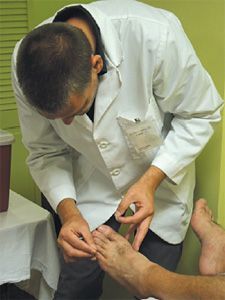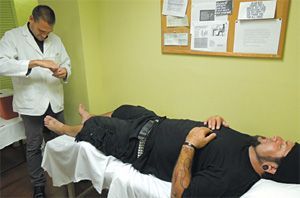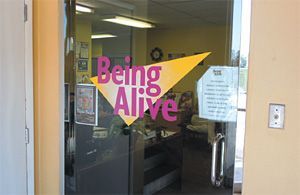The most important relationship I seek to nurture in the treatment room is the one a patient has with their own body. We live in a culture that teaches us to override pain, defer to outside authority, and push through discomfort. Patients often arrive hoping I can “fix” them, but the truth is, we can’t do the work for them. We can offer guidance, insight and support, but healing requires their full participation.
Ancient Relief for a Modern Disease
On most days, the lobby of Being Alive in West Hollywood, Calif. is filled with laughter and banter from patients waiting for their next acupuncture session to get in tune with their qi. They are patients who come from different backgrounds, but share one thing in common - they all are living with HIV/AIDS and are seeking relief through this more than 3,000-year-old ancient medicine.
Being Alive is a 1,200-member non-profit HIV/AIDS organization that for nearly 15 years has been offering acupuncture, along with other alternative treatments, to help people living with HIV/AIDS in Los Angeles.
A narrow hall, a paneled patient area and therapy room house Being Alive's twice-weekly acupuncture clinic where volunteer therapists and interns treat up to 60 members a week.
The volunteer therapists include instructors and interns from Yo San University in Santa Monica, Calif.
Since its introduction, acupuncture has been one of Being Alive's more popular programs, with countless members on its waiting list to fill slots of limited appointments.
The organization, like many other similar HIV holistic programs, has relied heavily on its volunteers and various donations to keep providing complementary services to this community.

Like other similar organizations across the country, Being Alive has faced financial challenges. Similar clinics around the state were affected by the Health Resources and Services Administration ruling in 2007 that prohibited against using Ryan White Program HIV funding for complementary therapy services. There have also been challenges with the fluctuating economy that have taken a toll.
The Center for Disease Control and Prevention states that each year, approximately 50,000 Americans are diagnosed with HIV. This number has stabilized over the years, but remains high.
To reduce the replication of the HIV virus in the body, HIV-infected persons are treated with antiretroviral therapy (ART). Side effects for these drugs include stomach upset, fatigue, and liver and sleep problems according to the research association AVERT.org.
In 2003, the Journal of the Association of Nurses in AIDS Care reported 31 percent of HIV/AIDS patients used acupuncture as an alternative form of treatment.
Since then, there has been a steady rise.
Being Alive Executive Director Kevin Kurth explains that the program was started to offer holistic treatment to combat the side effects of drugs that are associated with fighting this rapid, growing disease and to provide a alternative outlet for people looking for a natural approach to healing.
"We began to offer acupuncture as a complimentary with antiretroviral and Western medicine," said Kurth. "The No. 1 reason why people come for the acupuncture is the neuropathy, to treat pain in nerve endings mainly. But also to deal with stress, their appetite, nausea and all other side effects from the drugs."
Treating The Hiv Patient
Treatment of HIV/AIDS patients falls under two categories at Being Alive, according to Dr. Lawrence Lau, Dean of Academy and Clinical Affairs at Yo San University who oversees acupuncturists at the facility.
"There are two sets of patients. One wants relief from numbness, neuropathy, anything neurological, or nausea, fatigue, constipation, symptom-based.
The other set of patients are pretty OK, they have little symptoms, but just want to be well, or want continued wellness," said Lau.
If an HIV/AIDS patient requires more immediate and special attention, therapists identify and place them under a targeted 10-week program that includes routine care.
All of the care comes without a price tag.
The cost of acupuncture can hinder HIV/AIDS patients looking to be treated with this therapy.
"Many of our members are living on disability. I would say the majority, 98 percent, are under the poverty line so they can't afford treatment," said Kurth.
At no cost to members, the program allows access to those who could normally not take part in it.
Those who have taken advantage of the treatment so far said the treatments have been priceless.

Patients like Cory Scott have become reliant on acupuncture to relieve serious side effects from the HIV virus. Scott has been living with HIV for 10 years - he has been coming to Being Alive for the past two. Having always been big believer in natural ways to cure, acupuncture had always intrigued Scott's mind. He began inquiring about the therapy to care for his neuropathy.
Neuropathy causes numbness, tingling, or pain, often starting in the feet and moving to the hands, according to the American Academy of Neurology.
When Scott sees his acupuncturist at the clinic, he said he describes his main symptoms as, "an intense burning sensation. A mix of burning and cold sensation on my feet."
Scott said it took only two sessions of acupuncture and low-voltage electro acupuncture to start seeing a difference in his overall health.
"There are no words to describe it. I feel a world of a difference," said Scott. "Living with HIV, it is hard to keep your energy up. Your life does change. But now, I exercise more and I'm less fatigued."
Others like Mark Mallery, an acupuncture and HIV patient said having acupuncture offered to him at the clinic has opened his eyes to view his health in a different light. After seeing significant results, Mallery said he was hooked on the treatments.
"There was a palpable feeling of being better. I felt my body make better connections, when I was having consistent treatment. Acupuncture is so beneficial to have in your arsenal to fight," he said.
Mallery said he hopes he can have constant and rotating treatment on a regular basis.
"There needs to be an expand in the availability. It has become an issue because of the need. It is beyond important to offer this therapy. It is probably one of the most important services this organization offers."
The word-of-mouth praise that the clinic has received from both patients and interns from Yo San has gradually created a growing demand, causing a strain on their resources.
"Some therapists' private practices are growing so fast, and they don't have time to volunteer here.
While the popularity of our program is also growing, we depend a lot on our volunteers," said Gene Poppe, Being Alive Director of Development.
A Fulfilling Experience For Practitioners
The clinic has not only proven to be a success for the patients, but it has also been a fulfilling experience for Dr. Lau, along with his team of three interns and one instructor in charge of treating these Being Alive members.

The clinic has served as a learning environment for the interns who are in their final year of schooling and has broadened their overall knowledge of helping people heal from a complex disease with traditional medicine.
"We provide an opportunity for them to treat a different patient, experiencing different types of pain, under a well-defined set of conditions and perform acupuncture in a different setting, as opposed to an in-house clinic," said Dr. Lau.
Acupuncturist Antonio Whiteley has donated his time at Being Alive for the past three years.
In practicing acupuncture, Whiteley always felt the need to give back.
"I am a gay man and I wanted to give back to my community in this way," shared Whiteley. "It is something that I've always wanted to be involved in, there has always been such a stigma on HIV/AIDS, I don't think there was as much compassion brought to these patients, no one wanted to touch them or treat them years ago."
In lending his time at Being Alive, Whiteley has developed friendships with his patients and is passionate about his service.
"My patients love to come in, I talk to them also because I genuinely care about their health and they do get results.
From the neuropathy or viral loads go down and T cells go up," Whiteley said.
Whiteley recognizes that he has learned more and more about treatment protocol and has had to stay up to date with modern research for both the Chinese medicine and the disease.
"It makes me appreciate things more. It is a great balance outside of your practice, not doing it for the money but for the satisfaction.
I learn something new every time I go there: clinically, personally, everyone teaches me something valuable there," he said.
Whitely calls for other acupuncturists to think about lending their services, whether it is at Being Alive or any other nonprofit in their community. He believes that when professionals reach a point in their careers, they should just think about giving back.
"It goes to show that although Chinese medicine is an ancient form of medicine, you can use ancient medicine to treat a modern disease. It is so beneficial for people living with HIV, with their immune system, their mentality, a lot of people think it is just for pain," said Whiteley.
Through the camaraderie that has developed at Being Alive, most acupuncture patients at this clinic have been able to overlook their fear of needles and echo the words of Mallery when he states, "I would advise anyone who hasn't to try it, to be open to alternative medicine and broadening your possibilities to healing."
If you are interested in volunteering or learning more about Being Alive, please contact 323.874.4322 or visit http://beingalivela.org.


